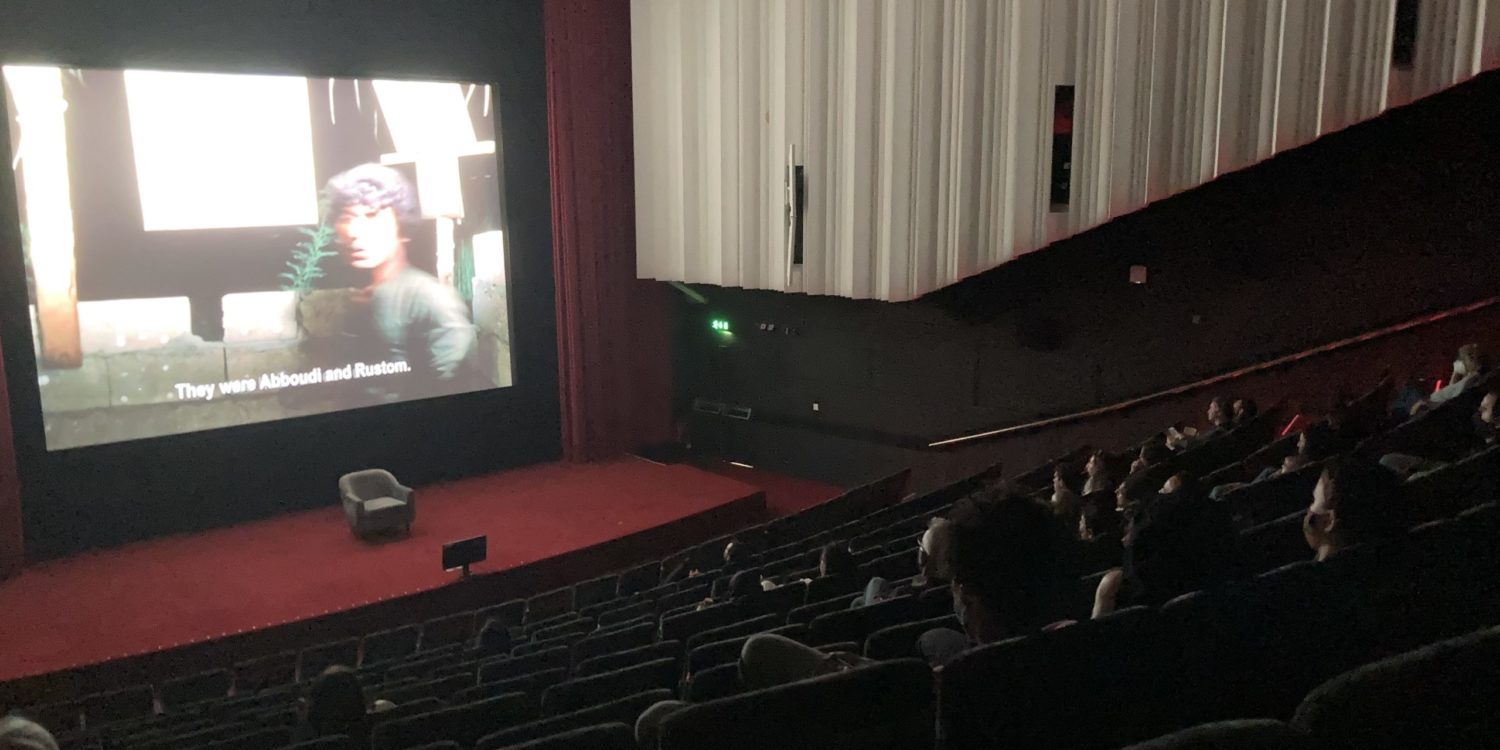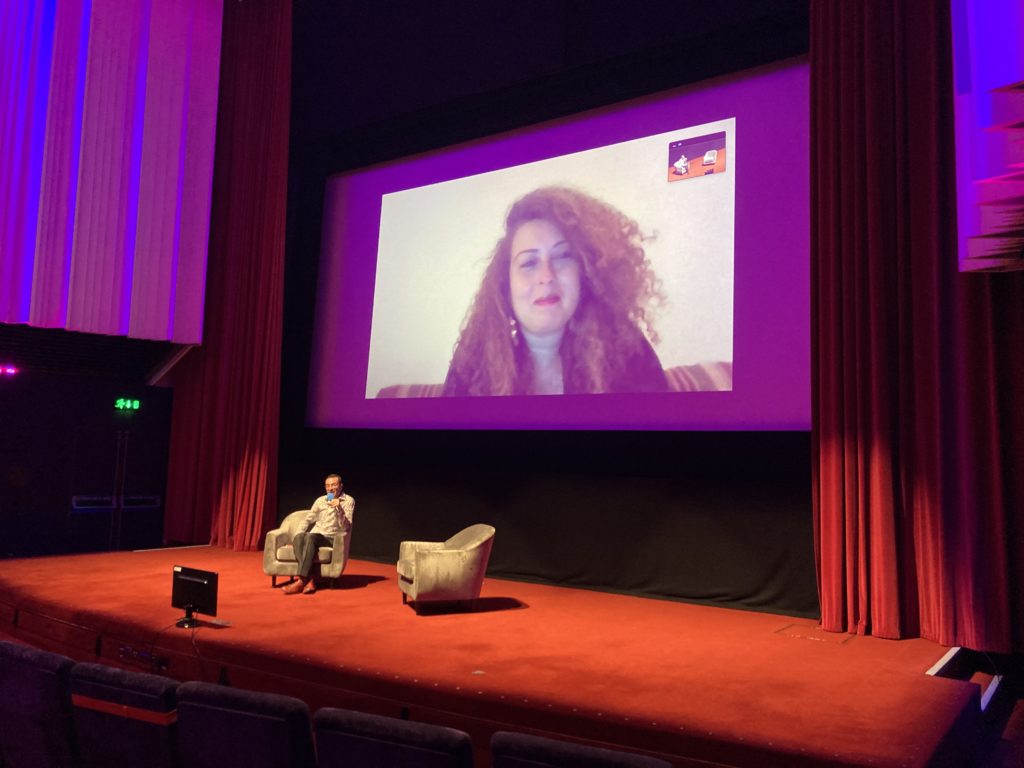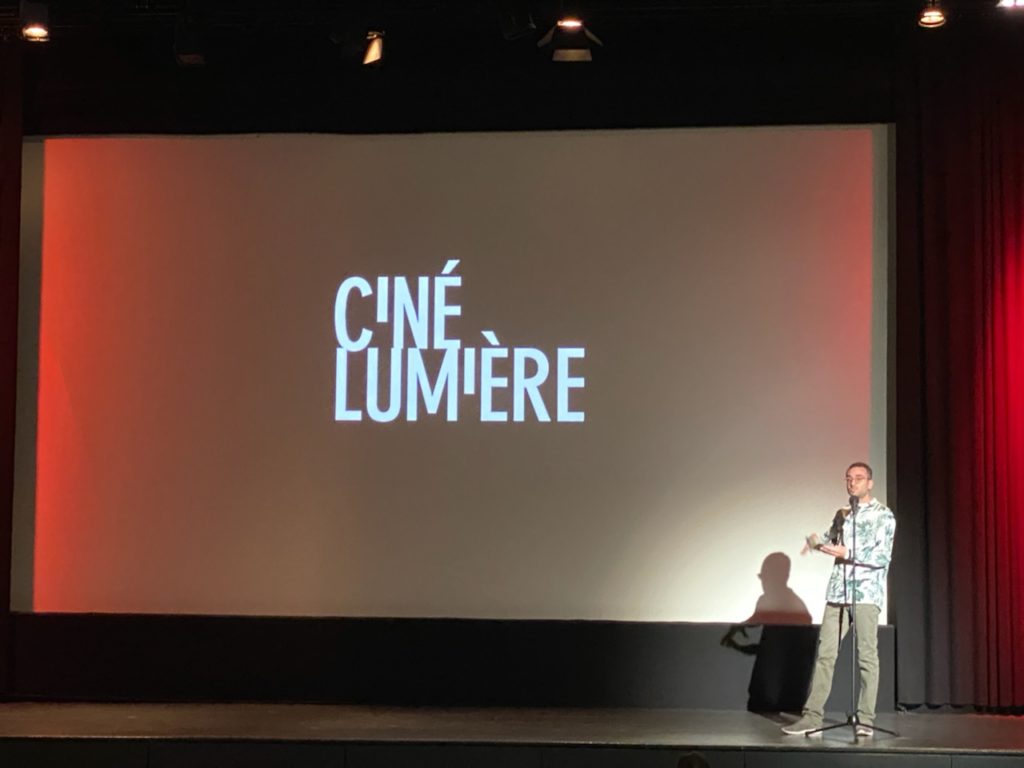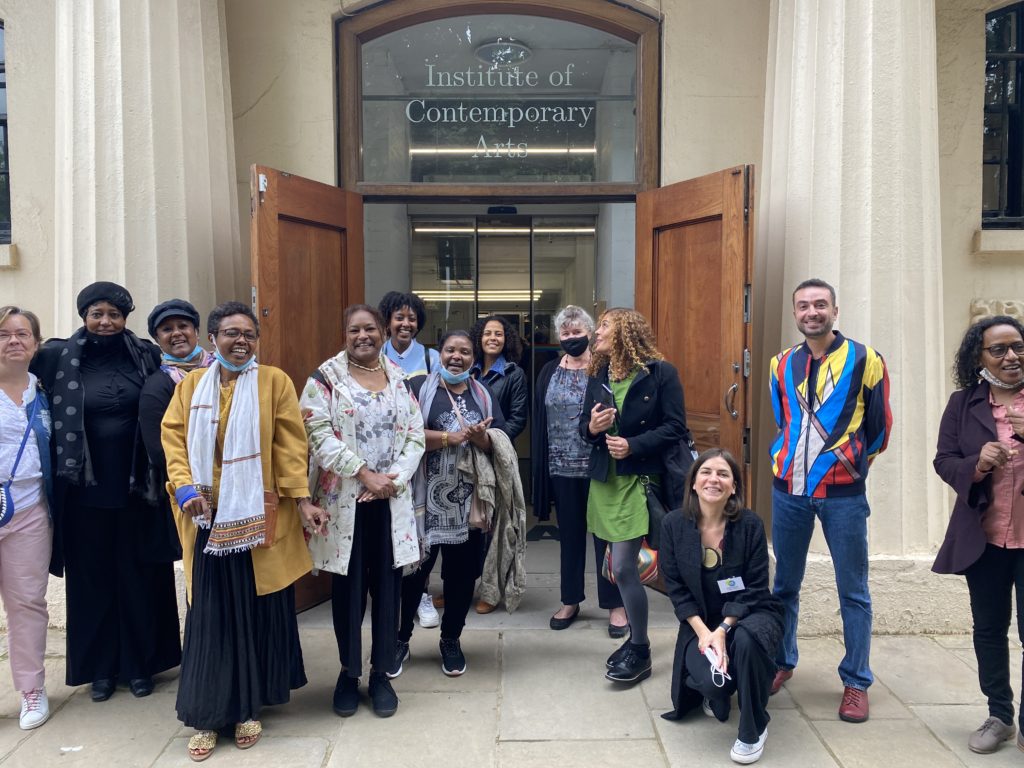SAFAR attendee Ja’far ‘Abd al-Hamid shares his experience of this year’s edition exploring Generational Encounters in Arab Cinema.
As the train pulls into Barbican station, my reflection in the windows barely shows my eyes above the medical mask that seems to have gotten progressively bigger over these past seventeen months.
Walking through the cavernous tunnel running beneath the Barbican Brutalist architecture designed complex of apartment blocks, offices and art centres, I can’t but feel like my 15-year-old self all those years ago, trying hard to stay calm and walk in a dignified pace that befitted the new suit I’d bought especially for the date at the cinema. On that occasion, it didn’t take me long to realise that perhaps I was overdressed, particularly when my date, her three girlfriends, and their mothers who were dropping them off, became red-faced, as they tried unsuccessfully, to suppress their giggles at the sight of me, my suit and tie, and big-stick brolly.
To be on the safe side, today I am in jeans and T-shirt!
The NHS app on my phone emits a green light, or so I think, as I scan my phone across the location code at the main doors of the Barbican centre. “Good to go!” The helpful woman, with kindly eyes, and a large mask, waves me through.
At the entrance to Cinema One, another pair of eyes, quite beautiful, greets me. “Safar Film Festival?”, she asks me, or I ask her, I am not sure – for almost a year and a half, I haven’t had much human contact, outside a very small group of friends, my local Tesco cashiers and the Amazon delivery wo/man – I am just grateful for the conversation.
I take my assigned place in this pond of blue seats, and almost say out loud, “hello, old friend”, as I reacquaint myself with the idea of sitting in a room with complete strangers to experience, collectively, a film on the big screen.
The Director of Programming at the Arab British Centre, Amani Hassan, who has moved mountains with her team to organise this celebration of Arab Cinema, introduces us to the festival, and talks briefly about the logistics of putting together such a wonderful event during these times of restrictions, lockdowns, tests and vaccines.
Festival curator, Rabih El-Khoury, guides us through the delectable feast of films from the Arab world and the diaspora that he’s selected for the festival. I am already adding a couple more films to my festival schedule.
Souad (Dir. Ayten Amin, Egypt, 2021) has such a humane, empathetic, funny, and yet visceral treatment of an every-day story of lost love that takes a turn for the tragic. In the Q&A with the director, whom Rabih interviews over Zoom, I relate to her, and the audience, how much I’d loved the film, the tears it brough to my eyes, and I ask her a question about her influences from Egyptian cinema. When Rabih enquires if she’d heard any of what I’d said, “no!” is her bewildered response.
Thankfully, Rabih’s memory is far better than mine, and he repeats my comments and question verbatim.
On the way out, I say hello to Amani; she doesn’t have the advantage that I had of seeing her on stage, being introduced as the Director of Programming at the Arab British Centre. “Sorry, who are you?”, she asks me and my mask, after I do my whole Arab “How are you? Lovely to see you? How are your family?” greeting.
A couple of days later, I am in the foyer of the Institut Francais, South Kensington. I am here for the first of a double bill of films starring the Tunisian French actor Sami Bouajila.
A Son (Un Fils) (Dir. Mehdi Barsaoui, Tunisia/France, 2019) is one of those films that start out with a moment of happiness, contentedness, freedom from the burden of pain and tragedy. And yet, such moments, perhaps by nature, are fleeting.
As Rabih explained in his introduction, the film is quite unique in Arab cinema in its look at the area of human organ donation, its troubled relationship with local laws, and the potential for illegal harvesting of organs by criminal gangs.
On a personal note, I am grateful for my grasp of the Arabic language; I can feel the music, the boundless love in the original Arabic title of the film – Bik N‘ish (addressing their child, a parent says, “it is through you (for you) that I live”).
The Blessed (Les bienheureux) (Dir. Sofia Djama, Algeria/Belgium/France, 2017) continues with the theme of parents’ love and their apprehension for the future of their offspring. Here, it is Algeria, immediately after the end of the civil war of the 1990s that mercilessly cut short the life of tens of thousands of Algerians.
Brilliant performances from an ensemble cast that includes the beguiling Lyna Khoudri, who’s gone on to have a brilliant film career, since making this film.
Sami Bouajila is sublime in both features.
Online, there is a Masterclass with the Palestinian actor Ali Suleiman. Conducting the session is Variety’s film critic Jay Weissberg – a truly delicious combination for any follower of Arab cinema.
Back at Institut Français, Their Algeria (Dir. Lina Soualem, Algeria/Qatar/Switzerland/France 2020) is a loving portrait of the director’s grandparents, who were born in Algeria and moved to France back in the 1950s and 1960s, when “France needed workers”, as her grandfather relates to her. The filmmaker gently tries to capture their memories and experiences on film, both for the world and for herself.
Next stop, we are at the Institute of Contemporary Arts, overlooking the magnificent Pall Mall.
Let’s Talk (Dir. Marianne Khoury, Egypt 2019) quickly dispels any expectations that the viewer might have had about Marianne Khoury, the niece of the great Egyptian director Youssef Chahine (“the father of African cinema”, as Mark Cousins called him) using her uncle as a tentpole for her directorial documentary debut; she does not.
Instead, this is a meditation on identity, on love, on Egyptian and Arab history, and on the cosmopolitan nature of the Arab world – Khoury having a Syrian, Lebanese, Egyptian, and Christian heritage.
For this lover of Arab cinema, in the brief interviews with Youssef Chahine that Khoury does include in the film, there is confirmation on the autobiographical basis for one of Chahine’s most iconic scenes in An Egyptian Story (Hadduta misrija) (Dir. Youssef Chahine, Egypt 1982).
You Will Die at 20 (Satamutu fi al-‘ishrin) (Dir. Amjad Abu Alala, Sudan/France/Egypt/Germany/Norway Qatar 2019) feels like an epic story beyond the actual events that we see on the screen; it feels like an Alejandro Jodorowsky, Grigoriy Chukhray and, indeed, Chadi Abdel Salam film.
The short film programme includes the Palm D’or winning I Am Afraid to Forget Your Face (Dir. Sameh Alaa, Egypt 2020), which is a great essay in visual storytelling.
Al-Sit (Dir. Suzannah Mirghani, Sudan 2020) is a lyrical story shot in a magical setting – Sudan, its rural nature, cotton fields and architecture of village homes.
The end of the film is particularly poignant, as the female lead quietly sings an old Sudanese melody, about a girl calling out for her love.
From the backrows of the cinema, a group of Sudanese ladies join in, singing with the girl on screen.
Later, by the entrance to the ICA, I say hello to the Sudanese impromptu singing band. “It reminded me of my wedding day,” one of them says, wistfully.
For this fan of films about childhood, the highlight of the shorts programme is Maradona’s Legs (Dir. Firas Khoury, Germany/Palestine 2019). Set during the 1990 World Cup and the Palestinian Intifada, Palestinian children compete to complete a photo album of World Cup teams, while at the same time, arguing over the merits of their adopted team (Brazil, in the case of the two leads), against the adopted teams of other kids.
The short is brilliantly funny and beautiful, as the world of childhood finds a way to exist in parallel with the complex and, at times, tragic life around them.
200 Meters (Dir. Ameen Nayfeh, Palestinian/Jordan/Qatar/Italy/Sweden 2020) takes place in Palestine and Israel, with the Israeli wall physically separating a father – played by the inimitable Ali Suleiman – and his wife and three children, who are living on the Israeli side.
Lift Like a Girl (Dir. Mayye Zayed, Egypt/Denmark/Germany 2020) is a debut documentary from the Alexandrian Mayye Zayed, who captures over four years the progress of teenage weightlifter Zabiba. She trains with the bigger than life Captain Ramadan, who from an open-air modest gym has trained four Olympic champions, nine World and 17 Pan African champions.
In his own way, Ramadan is a believer in women’s liberation and inner strength.
For fans of Egyptian film and TV productions, which are the most prominent in the Arab world, the film’s charm is partly in its honest – colourful language and all – portrayal of the relationship between the coach and his protégé. It also shows the interaction between the girls themselves, as the older, accomplished weightlifters, pass on the knowledge and their worldly experience to the young ones.
Now, with the festival’s physical screenings section complete, I am back to my old work-from-home and stay-at- home routine, pending the lifting of restrictions next week.
For company, I have the memories from the past ten days – the singing Sudanese ladies, the laughter and tears of the grandmother in Their Algeria, the gregarious Captain Ramadan, now scolding, now singing for his team members, and the voice of the titular character in Souad recording a song for her love.
Thank you, Arab British Centre, the Safar team, and the volunteers, for offering this film lover the beautiful gift of these movie gems on his return to the cinema.
With an academic background in film studies, Ja’far’s work has been focused on the Arabic community in London. His debut feature, Mesocafé, revolved around the Iraqi community in the run up to the 2003 invasion of Iraq. His shorts include Tabbouleh & Pie, a meditation on immigration and acceptance of the other. His upcoming feature “Kal & Cambridge” is a celebration of the community in London, humorously probing the generational gap between immigrant Arab parents and their UK-born kids.




